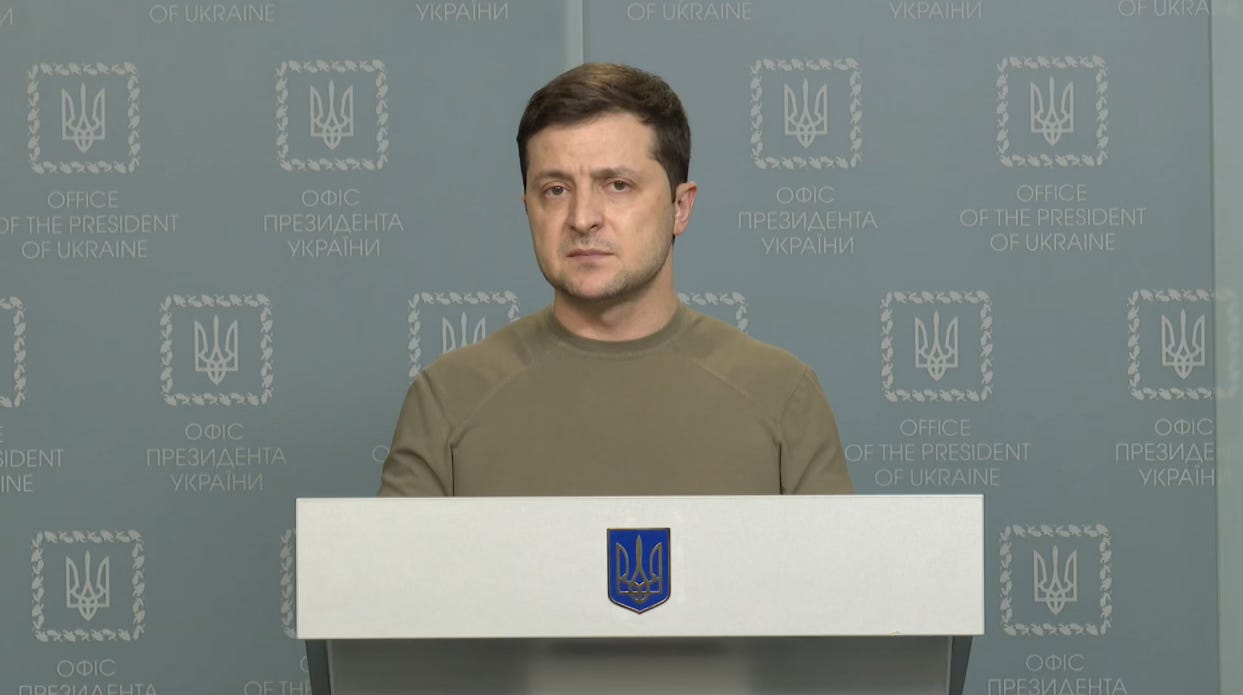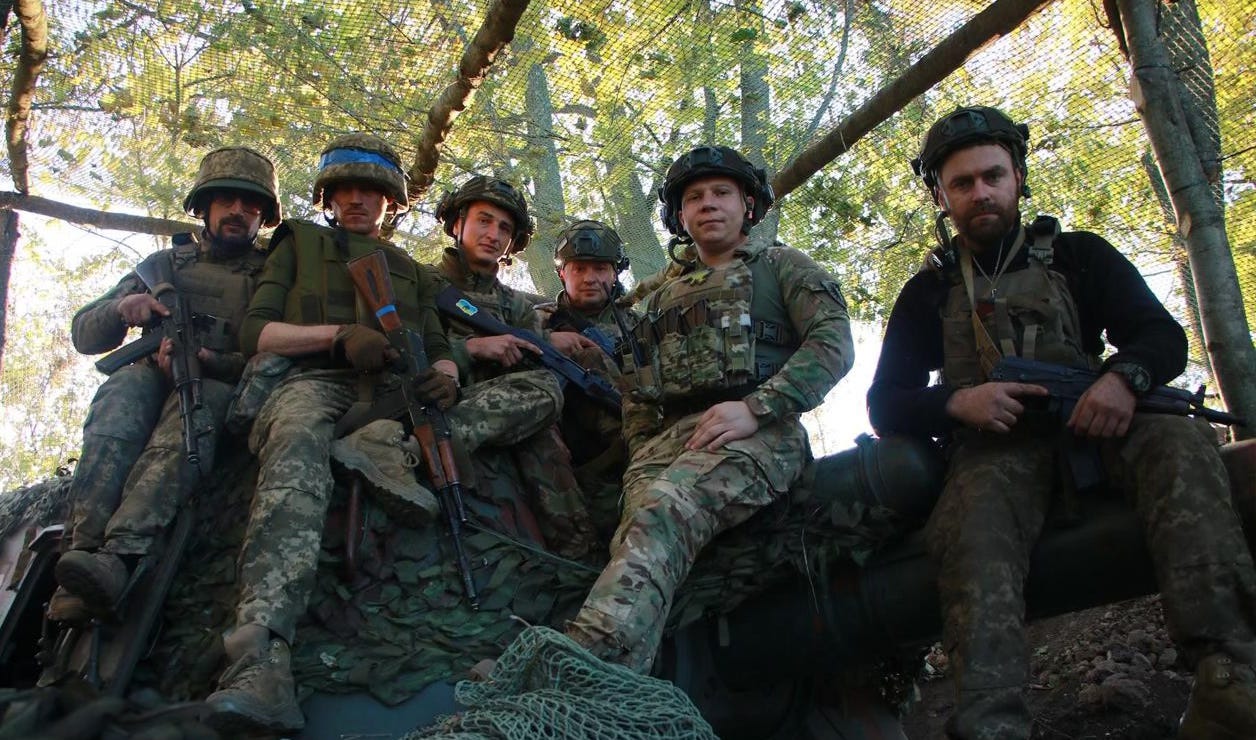1000 Days of War
Reflecting on one thousand days since the 2022 Russian large-scale invasion, and some thoughts on the trajectory of the war into 2025
What do we hear today? It's not just rocket explosions, battles, the roar of aircraft. It is the sound of a new Iron Curtain lowering and closing Russia away from the civilized world. President Zelenskyy, 24 February 2022
Today, the war in Ukraine – or at least the time since the large-scale Russian invasion of 2022 – reaches the 1000-day mark.
At this point in the U.S. Civil War, the Union had gone through three commanders-in-chief and was on the cusp of launching the coordinated eastern and western campaigns under U.S. Grant. And at the 1000-day mark after the March 2003 invasion of Iraq, coalition forces were at a low ebb as insurgent bombings plagued urban areas, and the President Bush admitted the invasion was based on faulty intelligence.
At the thousand-day mark of this phase of the war begun by Russia in 2014, Ukraine has suffered tens of thousands of military and civilian casualties, lost and regained large swathes of territory, and seen civilian infrastructure and priceless cultural artifacts destroyed. But it has also developed world-leading drone tactics and an entirely new strategic strike complex, employed extraordinarily effective strategic influence activities, re-invigorated its defence industry, and has become the first country to invade Russia in nearly a century.
And it has inspired us all with the courage and resilience of Ukrainian civilians and soldiers alike.
Besides reflecting on the tremendous sacrifices of the Ukrainian people since February 2022, the thousand-day point since that awful February 2022 day should also permit a certain amount of taking stock.
In 2024, the Ukrainian military sought a way to halt the rolling Russian offensive that was steadily gaining ground in eastern Ukraine and influencing the decision-making of Ukraine’s supporters. In the wake of the failed 2023 counteroffensive, and the Russian eastern offensive that followed, Ukraine needed to change the direction and narrative of the war.
Thus, was born the idea for the Kursk offensive, which was designed to change the trajectory of the war, hold Russian territory at risk, change Western perceptions of how the war was progressing for Ukraine, and force a military and political response from Putin. By and large, the Kursk offensive has (unfortunately) not achieved these objectives.
But even though the situation for Ukraine at the 1000-day mark of the Russian large-scale invasion is indeed forbidding, the trajectory of this war is not cast in steel. The Ukrainians have surprised us in the past and could do so again. But to prevent continued Russian gains on the battlefield and in the infosphere, and to delay any U.S. attempt at forcing Ukraine to the negotiate under unfavourable terms, what changes might be required from the Zelenskyy government?
Perhaps the first and most important issue is for Ukraine to conduct an honest and ruthless re-assessment of its military strategy. In February this year, when President Zelenskyy appointed General Syrskyi as commander-in-chief, he tasked him with developing a revised Ukrainian military strategy for the war, which he described as follows: A realistic, detailed action plan for the Armed Forces of Ukraine for 2024 must be presented. It must take into account the real situation on the battlefield now and the prospects.
The resulting strategy implemented under General Syrskyi has seen Russia seize the strategic initiative, Ukraine lose its eastern territory at an accelerating rate, a Ukrainian offensive into Russia which has not achieved its objectives and probably drawn valuable resources from defending eastern Ukraine, and the decline in Ukrainian strategic influence among its supporters. New ideas (and perhaps new leadership) will be required for an evolved military strategy moving forward into winter and 2025.
Next, the Ukrainian government must resolve the personnel challenges currently being confronted by the Ukrainian armed forces. The formation of new brigades, many without sufficient equipment, has seen a dearth of replacements for more experienced combat formations on the frontline. This is less a problem of quantity than one of internal institutional priorities. These can be solved with difficult yet necessary leadership decisions. And ultimately, the Ukrainian government may have to make even tougher decisions about the age at which people can be conscripted. While Ukraine faces difficult demography issues, which shaped the debate on mobilization, it may have to override these concerns if it wishes to have a sovereign nation that is able to ponder such challenges in the future.

Third, Ukraine needs to continue to work on communicating the impacts of any potential Russian victory on Europe, America and Asia. It is fair to assert that, apart from the Baltic nations, Poland, and Finland, many national leaders in Europe and beyond cannot envisage the full implications of a potential Russian victory in Ukraine. Even an agreement that saw Putin keep the territory that he currently illegally occupies would be a victory for Russia. The profound cost that would be borne by those in occupied Russian territory can already be foreseen, while the Ukrainian population would be embittered by the West’s strategy of providing Ukraine with just enough support for it to tread water for a time, but not enough for it to swim to safety. In the coming weeks, the Ukrainian government must somehow make western politicians more afraid of Russian victory than a Russian loss.
A good recent article on this topic, from Mykola Bielieskov, can be read here.
Finally, Ukraine will need to review and revitalise Ukraine’s strategic narrative to change western perceptions about Ukraine’s prospects in this war. It must not only be winning the war, but it must also be seen to be doing so. This requires it to win the story of the war. But to do this, the substantive changes to strategy and resource allocation described above must be implemented. And the Ukrainian government will need to convince western governments, the incoming Trump administration first and foremost, that this war is not inherently evil. It is a war, thrust upon the Ukrainian people, but worth fighting that is seeking to prevent a much greater evil perpetrated by Putin and his cronies.
Ukraine’s prospects in this war, while shaped by their own narratives, rest on continued support – and a reset in strategy – from its supporters in Europe, America and beyond. The path ahead cannot be laid entirely at the feet of the Ukrainian government and people. They have fought harder and sacrificed more for their nation, and for the existing global order, than any modern democracy since the Second World War. They have earned our ongoing, and indeed increased, support.
It will be very difficult for Ukraine to secure favourable terms in any war termination without the ongoing support of Europe and the United States. The strategy of NATO in the past 1000 days, to support for Ukraine ‘for as long as it takes’, is not a strategy but a slogan. Biden, Scholz and others who have feared a Russian defeat more than a Ukrainian defeat have demonstrated an immense failure of imagination. They can’t imagine just how bad a Russian victory would be for Ukraine, Europe and the West more generally.
They must do so. And urgently.
These politicians, and their advisors, must be able to imagine the immense strategic and moral benefits of a Ukrainian victory. That victory, at a bare minimum, must be an agreement that deters future Russian aggression, and ensures the future security and prosperity of a sovereign Ukrainian state. But reparations, justice for war crimes and Ukrainian reconstruction are also crucial.
The Ukrainian president recently noted that “for some, ‘victory’ has become an uncomfortable word.” That is a shame, because it is a vital posture and strategic mindset for the leaders of Western nations if they are to successfully deter or defeat the increasingly aggressive forces of the techno-authoritarian powers. If nations in the West no longer believe in stamping out such abhorrent strategic predation by authoritarians, the decades ahead will be extraordinarily grim for Ukraine - and the rest of us.





As always an interesting article from you, thanks. In regard of Kursk I cannot agree with you. I regard it as the biggest achievment in 2024 by UAF. And I cannot agree with your assessment of the leadership. No army in the world could have been more successfull and shown more resilience under such dire conditions. No army can keep the initiative, without enough weapons and lack of ammo and properly outfitted troops. Bidens administration and the lack of European military support share the responsability since 2022 for hindering UA, enforcing her to fight under irresponsible restrictions and lack of enough support. Its a shameful display of incapable Western politicians. The US and European strategies - I doubt if it deserves the name "strategy" - are a total failure.
Hopefully, this war won’t go down in history as ‘the war the West tried not to lose’ that ushered in a new wave of authoritarian dominance over Europe and, with the help of Russia’s allies, the wider world 😕